Dear Maine,
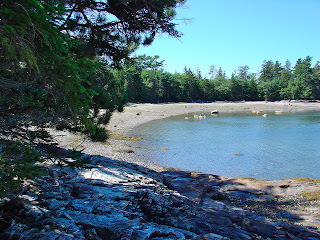 |
| Photo by Walter Henritze |
As a frequent visitor from Oregon, I have a few observations about you. They are meant affectionately, of course. When you come from a state where everyone wears socks with their sandals and nobody owns an umbrella, you do not take potshots.
Maine is not a large state by western U.S. standards, but if you start at the bottom and work your way up on the coastline, you will have gone north and south enough times to develop your own polarity. The underlying granite is corrugated and pleated and it trails its fringe into the sea like a hippie mama. As a consequence, most people in Maine seem to live somewhere on the water, and with a substantial acreage, too. It’s cheap. No one has much money and they get by selling each other antiques, plowing each other’s driveways, repairing each other’s plumbing, slapping on each other’s additions and installing each other’s generators. They’ve got a homemade sign up in their yards with their specialty and phone number, and the economy lumbers along at a perfectly adequate clip. By contrast, our economy in Oregon is based entirely on selling each other coffee drinks. We too are poor, but alert.
The magnificent granite also rears up inland, surfacing like whales. It’s not unusual to see a whole pod of granite slabs cresting the soil right in the middle of the woods. And it’s easy to see things in the woods. Out here we let our forests get quite unruly, but people in Maine like to tidy theirs. They keep a hacksaw handy-by, clip out any unsightly saplings and chip up the debris, leaving a neat duff floor and a view to the nearby water.
The houses have a big patch of these tidy woods in the rear, a vegetable garden out back, and a massive lawn bounding across the property and hooking up with the neighbors’. It is possible to ride a mower for several hundred miles most places, and right to the bottle redemption center everywhere. People come home from work and hop on their mowers, pushing the speed lever up to the max to outrun the black flies, and then they’ve just got time to boil up some lobsters and go to bed. That’s only in the spring, of course. Later they’re outrunning the mosquitoes. There’s a day or two between black fly season and mosquito season, and folks get on their phones to tell each other just when that is. “They took off yesterday here in Winthrop,” they’ll say. “They should be clearing out of Waterville real soon.” It’s party time.
Everybody in Maine knows how to take a lobster apart, and they eat the green stuff, too. No one is squeamish about dropping them in the boiling pot, either. I tend to cringe a little every time I see it, but I don’t have to slice my pork chops off a live pig. They drop their lobsters right into the steam, and then every one of them will maintain that the lobster doesn’t feel it. There’s no logic in this. They say this for the same reason people insist dogs mustn’t eat chocolate. More lobster for me; more chocolate for me.
But my favorite thing about Maine is the architecture. That’s a big word to apply to the houses that lope over the landscape, and implies a degree of deliberate design that isn’t actually in evidence. What really happens is someone back in the 1800s builds himself a house. He builds himself an outbuilding down the way. In the intervening years he accumulates children and odd building materials, and every time he gets a dab of money together he scabs on a new room. The new room gets put on wherever there’s the least granite. After a hundred years or so, the house is lurching across the yard and threatening to stagger into the outbuilding. Winters are harsh. At some point, it just makes sense to hitch the house up to the outbuilding, poke in the last interior door and grab the hacksaw without even going inside. And bingo, there’s your architecture.
There’s nothing about this arrangement that makes sense, from the standpoint of artistic composition. It’s not what you’d get if you sat down and designed a house that size. But somehow it speaks to me. It reminds me of my own interior landscape. I start with a modest idea, lose track, struggle for nouns, forget where I’m going, hook one random thought to the next, and before you know it, I’ve made an essay.
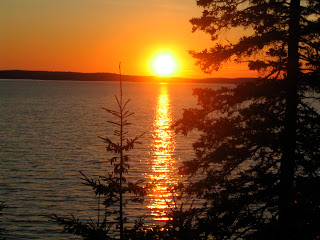 |
| Photo by Walter Henritze |

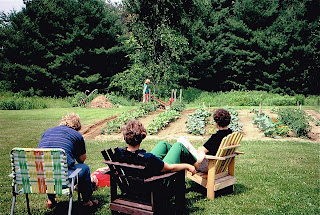
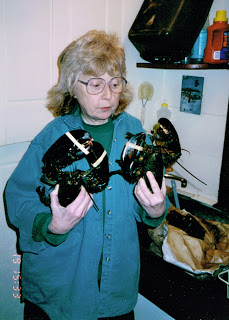
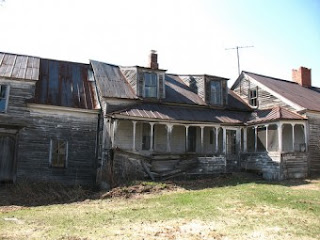
A photo essay if you will. Never been to Maine. Always wanted to. Of course, never been to Oregon either, and always wanted to. Maybe someday I'll win the lottery and be able to visit both. In the meantime, I've got some work to do on the shed I'm building off of the screened porch attached to the garage out back.
The dog will appreciate it if you hook up to the dog house along the way.
Funny post! I can see it now… Down here in Tennessee we can't have neat forests with well-pruned saplings and a clear forest floor, because some idiot brought kudzu over from Europe (probably the same guy who thought we'd love to have a pair of European starlings while he was visiting). Our forests are shrouded in an all-consuming blanket of kudze, turning every utility pole and power line into a trellis for elevation.
I hope to visit both of the states you lovingly describe… just as soon as the Hooey Gods get my Powerball numbers right.
I'm not sure I've ever seen kudzu, but from what I hear, it's just a matter of time, and I won't even have to move.
🙂 So wonderful!
Aw.
I love the rugged harshness of the landscape in Maine. I sure wouldn't want to try to build something there, though. Much better to save it as a vacation wonderland!
I also love the people of Maine. They ain't right, but they ain't right in a different way the rest of us ain't right.
I've never been to Maine but after reading your essay I have a picture of a place that is mainly rock perched on the edge of ocean and fringed by forest. I kind of like it. Maybe some day I'll get myself a passport and have a gander at it in person.
Come on over! There's a lot to see here. I'd stay out of Texas in the summertime, though.
Geeze, I've never been to Maine but you make want to move there.
You probably skipped over the part about the black flies.
Ah, and what an essay…"..trails its fringe into the sea like a hippie mama" Love it. I also have never been to Maine, but it is on "the list". Maybe I need to move it up a few notches. I do love Oregon, too.
I think they're similar, but I can't quite put my finger on why. Some kind of attitude.
This is our 6th year to summer in Maine… but not the part of Maine you wrote about… It's hard to even buy a fresh lobster in the grocery, let alone see the ocean or rocky shore up here in Aroostook County. Think potato fields…. think rolling farmland…. wetlands… marsh… private roads that belong to the paper/pulp companies…. It's a whole different world than down along the coast where most of the tourism is. It's the part of Maine that is as dear to me as the coastal area is to you. By the way, we're still waiting for that day of respite between the mosquitoes and the black flies.
Most of the time I was in Maine I was staying with my sister in Sidney. We did make an assault on Mt. Katahdin once and got battered back by a low, fast cloud. I love it all.
Sidney! That's just up the road a piece from my place in Augusta.Enjoyed your take on Maine. Very well done.
Yes, a very tiny piece! I probably drove right by you.
And always a wonderful essay at that, my friend. Now I'm hungry for lobster, but all I have is chocolate. Will have to do.
I have to admit I'd rather have the chocolate.
When you love rocks, and you love lobstah, there's no place like Maine. And often there's a breeze brisk enough to keep the insect life from settling.
Dave, who is mosquitoes' favorite snack, once ran full-out from the shore to the car a half mile away to get away from the swarm that was hammering him in a 30-mph breeze. When we finally caught up, he was still smashing the bugs that came in with him on the inside of the windows. The suckers would find him during Katrina.
A great essay, and I'm planning a Maine vacation this fall. I know nothing about the state, except that I want to go. Hope we can find some hiking, and some lobster.
I think you'll get your wish. If I lived in Florida, I don't think I'd wait till fall.
Missed both Maine & Oregon on my two trips to US from Australia and now I see what I missed. Delightful writing, Murr!
Thanks! To be fair, there's a lot to see here. You can't do ALL of it. Next time.
We're in Maine now, and we're glad. It's about 80, but there's a nice breeze.
If you have time, come over to Penobscot – we'll take you to Acadia.
Deal! I haven't been there in 25 years.
To Glenda in FL – check out Acadia National Park – it should have everything you want.
Thanks–we try to hit every National Park that we come across. I was surprised that there is only one in the state.
Oh my…
We live in one of the OTHER national parks in Maine…actually there are seven Acadia Nat'l Parks. There is also Baxter Park.
Ours is Schoodic…7 miles across Frenchman's Bay. The others are islands…not so accessable.
We very seldom go across to the big island of Mt Desert where the Acadia you mention is. ("nobody goes there anymore…it's too crowded!")
We Mainers prefer the Schoodic Pennisula where only 10 % of visitors ever show their campers. We live in Winter Harbor. An art community of amazing talents.
I just like saying Schoodic. Schoodic Schoodic Schoodic! Ha!
As much as pushing lobsters head-first into a boiling bath will make me shudder, consider what I heard a couple of tourists did to some poor innocent crusty's in my Atlantic Canadian province – baked 'em in the oven. Couldn't figure out why they kept clawing at the oven window. For awhile. Then there were the other tourists who innocently wondered how to kill a lobster – and gave their best guess as "shooting them".
Gaah. They just STUCK THEM IN THE OVEN? We do have to contend with it all here too, with the Dungeness Crab.
When I visited Maine, I was struck by the number of taxidermy signs by the roadside. Maine has taxidermists like Oregon has baristas.
I usually make it out of there only stuffed with lobster.
What a wonderful essay about Maine! My daughter-in-law is from there, I'll have to show this to her.
I've never been to Maine, but my bucket list has "drive Highway 1 from Maine to Key West" on it. I do have a photo of myself in Key West at the end of Highway 1 (or was that the beginning?).
Thanks for stopping by my blog, I'll be back to see more of yours.
Obviously, for you, my Peep, it's at the beginning!
My aunt, an LL Bean employee, lives in Old Orchard Beach and we spent a lovely, slowly-paced week there meandering around seeking out lighthouses, taking boat rides, and exploring by bicycle. It is a place I'd move to in a heartbeat.
You're in Pennsylvania, right? Another state with good people in it. But a little hot. Go ahead and move, in a slow, relaxed heartbeat.
Thanks for the photo credit . . . we have recently returned from the PB and, whilst sitting on the porch, mentioned missing you several times. Much love.
I miss you too!
Thanks for the photo credit . . . we have recently returned from the PB and, whilst sitting on the porch, mentioned missing you several times. Much love.
I miss you too!
Thanks for the photo credit . . . we have recently returned from the PB and, whilst sitting on the porch, mentioned missing you several times. Much love.
I still miss you too!
My sis and bro-in-law lived there for quite awhile. Outside of North Waterford or someplace. Close to Stoneham, NH. 75 acres of forest behind their lot. I visited after having breast cancer in 2003 and looked up into the sky and into the scary overgrown grass paths reminding me of Stephen King and it WAS FABULOUS!. Just beautiful.
Except, I dint live there in the winter,which is why they eventually moved back to Charleston, SC.
I think I like it better in the winter, but then again, I don't like heat and bugs. Stephen King is all over that landscape. I read a book of his once where there was a buried alien ship just barely under the surface in the woods and I KNOW he was inspired by my granite whales.
That was great! I liked the way your observations became the essay in the end. It's like a blog post that was just sitting on the front porch, waiting for someone to come by so it could chew the fat awhile.
Ay-yep.
Now you've got me wondering exactly where in the world the phrase "chew the fat" came from. Pretty sure I'd like it, wherever it is.
Cant say about chewing the fat but I do recall hearing of blood thirty Indians sitting around the campfire chewing the rag…
Thank you so much for explaining the main elements of life in Maine. These are helpful for those of us who has lived mainly in the middle, between the coasts.
And don't worry about your writing. Most of us have learned how to read between your non sequiturs.
Ah, I've got you right where I want you! Time to slip in the subliminal stuff.
My daughter wound up in Maine thanks to Uncle Sam's Navy and has made it her home. She loves it there which makes me very happy. She never liked Ohio much and it delights me that she's found a home — although I miss having her here. She is an old soul as I suspected in her infancy and something about Maine had given her a peace that she never had here and what more can a mom ask for?
But you're not THAT far away. Little bitty states back east, and all. I do think of Maine as a place where you can start out an old soul.
I love Maine. My favorite place other than where I actually live (Washington).
I once asked a lobster market guy if the lobster knows he's going to get boiled and eaten. He said, "Sure he does. But he doesn't mind."
Sounds like a Mainer!
He's telling people right now about the lady who asked if the lobster knows he's going to get boiled and eaten.
You're going to want to stay off the phone for the next few days. Keep the line clear.
The Tourist Board of Maine will be calling, hounding you for the rights to this piece for all future promotional materials.
Promotional! I decided not to send this to any of the Maine magazines, thinking they'd find it derogatory. Which it totally is not.
Murr, I always say that winter is too cold and slippery to be outside, in spring you have black flies and in summer mosquitoes and humidity. When autumn comes the weather is finally perfect and most of the bugs are gone, but just when you want to go hiking the hunters are out and its not safe! Maine is so beautiful but it sure makes it hard to be outside! I have seen people in full netting in summer just so they can go outside without being eaten alive by insects! Still, I love the state also, especially in spring when the lupine is in bloom, or in autumn when the leaves are changing. You forgot to mention fiddleheads though. That's the other green stuff Mainers eat! (me, I don't like lobsters but I love steamers and scallops!)
First place I ever had fiddleheads, as a matter of fact. I also left out "mud season." Right before black fly season.
You are a romantic, that's what you are.
That's it! Now I'm going to go write me some Chopin.
@squatlo: kudzu came from Japan. Not everything invasive came from "Europe", me included 😉
Beautiful prose Murr. Have you read " The Beans of Egypt, Maine"? by Carolyn Chute? Different kinda Maine. Harma
That sounds familiar. Sorry to say that even if I've read a book, it doesn't mean I remember it. I can even read mysteries two or three times and still not know whodunnit.
Now you’ve done it. Homesick again… Funny, I don’t remember the flies or even mosquitoes, but then I was one of God’s chosen who got to live out on an island. (But maybe Dave was on the mainland and he kept all those nasties over there with him.)
I have a bowl of stones from our Peaks Island beach sitting on my coffee table down here in VA. They are among my greatest treasures as I seldom get north of my house in the Poconos (PA) anymore. But lobstah… ah, yes. The perhaps more humane way is to stick a small sharp knife in and kill the poor things before boiling them to death, let alone sticking them in an oven. (BAD KARMA!) As a vegetarian today, I never crave meat… until someone mentions lobster, then the saliva glands kick in and remind me…………… sigh.
I have traveled and lived in many different places in the world. Maine has to be among the most beautiful. Great post.
Good heavens, but there seem to be a lot of Maine people reading Murrmurrs. And yes, Dave is useful in keeping the bugs off other people.
First time I met the flies, I'd volunteered to mow Margaret's (huge) lawn and got on the riding mower to give 'er a go. I put the speed at "1" because I'm a sissy and there were some slopes and angles to negotiate. Then the flies started in. They bite a little chunk out of you and inject anti-coagulant so you have little streams of blood coming down all over your face and look like you've just taken off your Crown of Thorns. I am a serious sissy, but I had that mower cranked up to "5" in no time. Flew over that yard.
Hey Murr! Fascinating stuff on both states; I've never visited either, but I feel the urge now. And I'm even more intrigued by your internal landscape. I would swear mine is more structured, but I suspect they're rather similar. Indigo x
Yours might be more structured, but you're younger than me. Just you wait.
Dear Murr,
I can only conclude that your interior is as strangely wonderful as the houses that face the fierce winters of Maine. A beautifully constructed essay, one delightful room at a time.
Keep on constructing these wonderful insights. I think I think the way you do, sort of rambling into what I meant to say. But your essays stand up to time much better!
Thanks for the morning wake-up!
EVENtually the ramblings come full circle. The trick is to try to get them to bend around in a hurry so you have an essay instead of Grandma's Slipped A Cog Again.
After 10 chilly, poor-ish years in Maine (mostly near Damariscotta) I decided that I wanted to live someplace just like Maine, only with milder winters and more, and better jobs, and that landed me here in Oregon 15 years ago. While there are some aspects of Maine I miss (the vernacular architecture being high on the list) I have no regrets.
Kind of similar politics, too.
Hi Murr,
I guess I could say I "know" you from Julie Z, but I don't "know" her either, but I like how both of you think so much, that I feel like I do. I'm here in IL, far away from the coasts. I'd like to see both Oregon and Maine. Your writings kind of sate me between fierce episodes of wanderlust. Good thoughts, as always! April
You remind me of a familiar conversation we keep having here–I relate something from my Facebook page, and Dave says "is she a friend of yours?" and I say "yeah, no, she's a friend of my friend X," and then I remember I haven't met X either.
First time I read anything of Julie's I thought: I know this woman.
Oh, and as a person who will be having a colonoscopy soon…I deeply appreciate all the poop you write about. To say I am freaked out about it is an understatement. It goes against everything I believe in. April
Don't freak out! Colonoscopies are a BLAST!
While I will appreciate, deeply, the melodic, and I hope odiferous, breaking like the wind….I DO NOT want to wake up mid-proceedure…nor do I want to see pictures/video/drawings of said proceedure. I want to be out like a light until it's all over, and I'm back farting happily and with abandon in the recovery room. April
Just had my first colonoscopy last week, and it was everything people said it was, and more. And that's not good.
I unfortunately have to have another in three years; I will not speak of it again until then.
Evil, evil, evil.
But good luck, April.
I seriously enjoyed mine. Everything came out great.
I love this. It helps me understand why a friend and his wife couldn't wait to retire to Portland, Maine. It also makes me think that Maine and small-town Minnesota have a few things in common. We even have some stone dragons jutting out of the woods up in the north where the glaciers got creative.
I think you're right about Minnesota. Where, I believe, your stone dragons could do really well if they ate mosquitoes.
"The way life should be." Pretty much sums it up. Having just returned from our cottage in Maine for a week of pure bliss soaking up the sun, eating lobsters with abandon and kayaking along the Webhanet river I am experiencing withdrawals…….But, there is always next weekend.
Wow, I don't think you're giving your withdrawals enough time to set in.
Heres hoping you visit Minnesota sometime and write up a take on it. Anyway we're looking for a backup for the Lake Woebegon guy…;)
Him. He never answers my letters.
I enjoyed the visit. When we visited Maine, I ate lobster for lunch and for dinner.
Dave once ate so much lobster in one day that he fell into a fitful sleep with moaning and sweating and crying out and I thought he might be having a heart attack, but I didn't wake him up because who wants to wake up to that?
Oh, Oregon- you are the antithesis to Utah. I've often wondered what it would be like to live in a population which is not obsessed with Mitt Romney and mani pedis. It sounds like Maine right be right up my alley. If only I knew how to slap on an addition.
I guess we're not obsessed. I had to look up mani pedis. Looked like Latin to me.
I've always wanted to see the New England states. Eat fresh lobster, and make fun of the way they say Coca-cola. Maybe someday.
Coker Coler?
And you both have Portlands. Maybe you said that and I missed it. Thank you for the travelog. Have actually always want to go to Maine and now I want to go more.
Our Portland was named after their Portland. (Well obviously not before.) It was a coin toss between Boston and Portland. Really.
Think you could have built a nice beach bonfire with some of that dilapidated building kindling.
Dave and I tear off parts of houses and burn them all winter. Mostly we tear off parts of other people's houses. Don't tell.
I went to Maine twice when I was young, that was where my grandfather lived and died. I've always wanted to go back, it's a very pretty state.
I like how its citizens are distinguishable from other Americans.
Love the photo of the Maine house. I, too, am a fan of the architecture. Beats the heck out of having to shovel your way to the barn in the winter.
And it only takes about a hundred years!
Wonderful comments on Maine. I love it there. My grandmother was born and raised in Belfast. I've visited the state three times and it only makes me want to go back again and again. Although Maine folks are called Mainers, my grandmother began writing her story and entitled it "Memories of a Maniac"…I have her sense of humor!
I've heard Mainiacs before, but then again the Mainers call their southern neighbors "Massholes."
Dropped into your site on a recommendation from Blog Fodder. I live in the western mountains of Maine; far different from the tourism economy of the coast. The wife and I have a small post and beam cabin on a dirt road and are able to subsist here on our small retirement. If you can stand the winters (and the black flies, mosquitoes,midges and no-see-ums in the summer) it is a great place to live. We are truly a four season paradise: snow season, mud season, bug season and getting the fire wood in season. Outer-of-staters probably see it as snow mobile season, fishing season, boating/hiking season and hunting season – and there is some of that – but it is different when you live here.
Great blog – I will check in regularly.
the Ol'Buzzard
Aw, I miss the Fodder. He is laying low. I love the winters. I can even drive in Maine snow, which I can't here (it's frozen snot). I'm glad you weren't offended. I almost think I remember you from somewhere…
There's a lot more to Maine than the coast, all right. Still never made it up Katahdin, half of which became invisible when we started up. But my favorite part of Maine is Mainers.